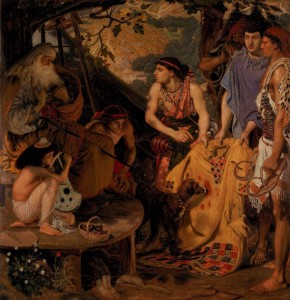Dear Father John, this is a question that has been bothering me for quite a while. I heard that God has favorites. Admittedly that seems obvious enough in the B ible. But I can’t imagine God loving some people more than others. At the same time, I can’t help but have a twinge of jealousy when I hear how close other people are to Him. I wish my relationship with Him was just as close. What does it mean for God to have favorites? Does it mean He loves some people more than others? Is it sinful to wish you had the same intimate relationship with Him?
ible. But I can’t imagine God loving some people more than others. At the same time, I can’t help but have a twinge of jealousy when I hear how close other people are to Him. I wish my relationship with Him was just as close. What does it mean for God to have favorites? Does it mean He loves some people more than others? Is it sinful to wish you had the same intimate relationship with Him?
I am not sure where you heard that “God has favorites,” so it’s hard for me to see the whole background of this question. But I think it’s a question worth reflecting on, so here are some thoughts.
Is God Just Like Us?
The basic problem underlying your first question (you do actually ask two questions here) is what theologians call anthropomorphism. That’s a fancy word which refers to attributing human qualities to God. Now, it’s natural for us to do this, especially since God reveals himself to us in the Bible using human language. And because we are created in his image and likeness (cf. Genesis 1:27), there is something to this approach. But it is very limited. The Catechism talks about this. For example:
(CCC #42) God transcends all creatures. We must therefore continually purify our language of everything in it that is limited, image-bound or imperfect, if we are not to confuse our image of God–“the inexpressible, the incomprehensible, the invisible, the ungraspable”–with our human representations. Our human words always fall short of the mystery of God.
To say that “God has favorites” involves applying a very human expression and a very human reality (we all have favorites) to God, who “transcends” our human limitations. God certainly doesn’t have favorites the way we have favorites. Our human capacity for love is limited and influenced by many factors, including our fallen human nature. And so we have natural preferences and affections that can, if we aren’t careful, lead us into prejudice, bias, and neglect towards those we are not naturally attracted to. Those natural preferences and affections don’t have to lead us into those sins – it is perfectly acceptable to experience and act on a preferential love or affection for certain people; this is where friendships and spouses come from – but they can.
But as we grow in Christ, we are called to develop a supernatural capacity for affection and love, a love based not on our natural affinities, but on the needs and the dignity of the other person. The Holy Spirit’s gift of piety comes into play here. Piety enables us to begin seeing others from a supernatural perspective, not just from a natural perspective. And when we do that, we start acting as Christ acted, with a universal and pure love.
God’s Love Is Different
And now we come to the crux of your question. We know that God loves every single one of us (see Catechism #605 and #618), but does he love some more than others? If that were the case, it would mean that God has a limited amount of love, so to speak, which he has to portion out in chunks according to his preferences. But God is infinite, and his love is infinite – no limits, no portions, no measuring sticks. God is love (1 John 4:8); his very nature is love. Whenever he enters into relationship with another person, like you or me, his love is total, absolute, unlimited in any way whatsoever.
Star Differs from Star
So, God doesn’t dish out his love in different portions according to who he likes better. Not at all. And yet, there is a difference involved. The difference isn’t with God, but with us.
Each of one us is a unique creation, a unique person. My relationship with God will never be the same as yours, and yours will never the same as anyone else’s. This is because we are spiritual beings, and each spiritual being is truly individual. Just as you and I can be very close friends with the same person, my friendship with that person will necessarily be different than yours, because you and I are different. God respects our individuality, and he rejoices in it (after all, that’s how he made us – unique!). And so every person’s relationship with God will be unique. In heaven, we will all be saints, but each saint will reflect a unique facet of God’s glory; no two saints will be just alike.
And, surely, some saints will have attained a greater degree of holiness than others. How does this happen? Just as God designed the visible world to be full of an almost infinite variety of creatures, and the beauty of the universe flows from their difference, their interdependence, and their harmony, just so in the spiritual realm. He calls each of us to follow him, but in different ways, with different natural talents, with different gifts. And each of us will respond with different degrees of generosity and faithfulness, so that his grace will bear more or less fruit in our lives. And so, heaven will be filled with manifold expressions of God’s wisdom and love, and the glory of that spiritual variety will be infinitely more breathtaking than the most magnificent natural landscape. St. Paul makes allusion to this when he writes “For star differs from star in brightness” (1 Corinthians 15:41).
Of Gardens and Drinking Gourds
One way to think of this is to picture a garden with many types of flowers. The sun shines equally and fully on all of them, but each one of them receives the light of the sun in accordance with their unique qualities – some receive more sun because they are bigger, and others less because they are smaller. But each receives enough, all that it needs, and each reaches its full potential. And so violets are small and delicate, lilies are aromatic, roses are… well, roses.
We too receive the full love of God – each one of us, and if we don’t turn away from the life-giving brilliance of his grace, we will grow into the dream that God had for us when he called us into existence.
Another common comparison is to think of different kinds of cups and glasses – an elegant wine glass, a fragile tea cup, a hardy mug… Each one of them has their own size and shape and charm. Some can hold more liquid than others, but all of them can be filled. And no matter what size each one is, when it is filled, it is full. Likewise with our souls in heaven. Whether I am a big mug or a delicate cup, in heaven I will be completely filled with God’s love; I will lack for nothing; I will rejoice in the Lord and in all the other saints, even the ones who hold more liquid than I do. As St. Thomas Aquinas put it, eternal life will bring “the complete satisfaction of desire, for there the blessed will be given more than they wanted or hoped for.”
Envy or Emulation?
From all of this, I think you can see that your second question has also been answered. It is not a sin to desire complete communion with God, but it is a foolish distraction to become discouraged or envious of someone else’s progress in holiness! When we run into other people or read about saints who experience a deep, intimate relationship with God, we are faced with a choice. We can either envy them this intimacy – becoming angry and vindictive towards them because they have achieved a degree of holiness that we have not achieved. Or we can emulate them – we can acknowledge the beauty of the holiness they have achieved, and use their experience as a spur to our own efforts pursuing spiritual maturity. The second option is the better one: when we encounter people holier than ourselves, they should inspire us to continue following the “constricted road” (Matthew 7:14) that leads to the life we long for.
Let your discouragement be driven out by hope; let your frustration be banished by faith; and, let your frown be erased by love. Let Hebrews 12:1 be your motto: “Therefore, since we are surrounded by so great a cloud of witnesses, let us rid ourselves of every burden and sin that clings to us and persevere in running the race that lies before us.”
+
Art for this post on whether or not God has favorites: The Coat of Many Colours, Ford Madox Brown, 1864-1866, PD-US published in the U.S. prior to January 1, 1923, author’s life plus 100 years or less, Wikimedia Commons.





